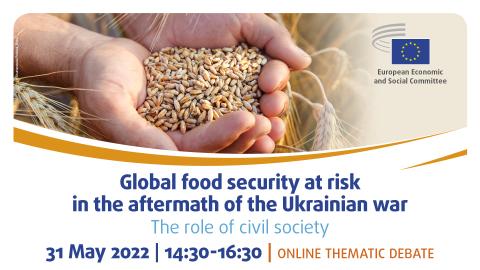European Economic
and Social Committee
Global food security at risk in the aftermath of the Ukrainian war
Scope and Objectives
On 31 May 2022, the NAT and REX sections of the European Economic and Social Committee (EESC) will host an online thematic debate on global food security in the aftermath of the Ukrainian war. To address the immediate humanitarian crisis, a globally coordinated policy response is urgently needed in the short term, while building sustainable and resilient food systems and policy response frameworks to prevent future crises is necessary in the medium-long term.
The event will bring together representatives of EU institutions, civil society and other stakeholders to discuss:
- the impacts of the war on food security worldwide (with a focus on some specific world regions);
- the actions needed to ensure food security while fostering resilient and sustainable food systems, i.e. through trade and development policies;
- the role civil society can play in ensuring food security both in Europe and beyond.
Context
The war in Ukraine will have serious consequences for global food security, exacerbating the food price surge, further destabilizing already fragile agricultural markets and adding to a difficult socio-economic situation worldwide. The Covid-19 pandemic and climate change were already putting agriculture under pressure everywhere in the world.
In particular, the war and the ensuing sanctions directly affect global food supplies and fertiliser prices, as well as energy prices. This is is causing enormous disruptions in global trade. Together Russia and Ukraine are among the top three exporters of wheat, maize and sunflower oil, and Russia is a major exporter of energy and fertilizers, while Belarus, siding with Russia, is also a significant exporter of fertilizer.
Ukraine’s farming, food production and export operations have come to a standstill, while exports from Russia and Belarus have been sharply curtailed due to extensive sanctions. The 2022 sowing season in Ukraine has already been deeply affected due to extensive and targeted damage to farm and food systems infrastructure, and severe environmental pollution from the use of weapons. Even if the war were to end soon, its implications for global food markets will last until at least the coming year.
In September 2021, more than 161 million people in 42 countries were already acutely food insecure. Nearly one in three people in the world do not have access to adequate food and for about 3 billion people the costs of a healthy diet were out of reach. These numbers risk rising further and therewith falling further short of reaching the Sustainable Development Goals by 2030. According to initial FAO analysis, the number of undernourished people globally is projected to increase by 7.6 million people (moderate shock scenario) to 13.1 million people (severe shock scenario).
A globally coordinated policy response is urgently needed to address the immediate humanitarian crisis in the short term and to build sustainable and resilient food systems and policy response frameworks to prevent future crises in the medium/long term. The EU should continue to support countries worldwide in the conversion towards resilient and sustainable agricultural and aquatic food systems, from production to consumption, including through development and trade policies. Civil society has a key role to play in this context.
Do you have a question?Contact us
